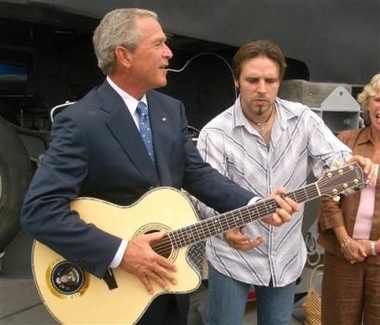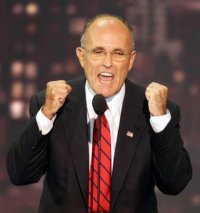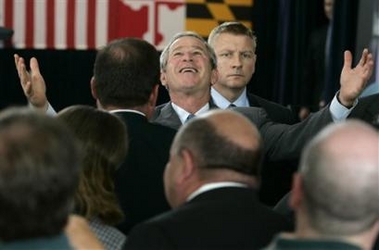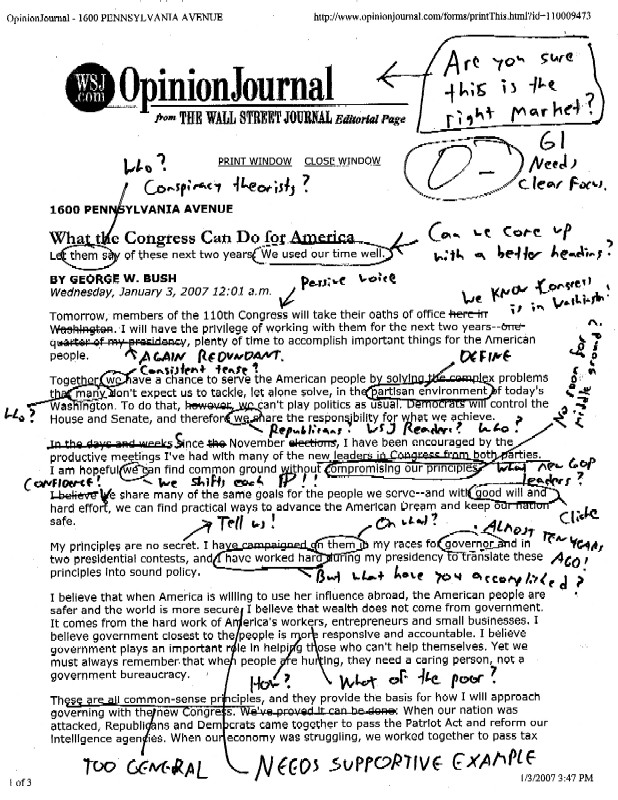Category / Dubya

Gustav, Republicans, and American Amnesia

As Gustav’s mad whorl whirls north to the Louisiana coast, the current chatter has less to do with New Orleans’s numb carcass, the rebuilt homes and levee systems that will almost certainly be annihilated, and the wave of destruction that Bourbon Street hipsters will guzzle down with dutiful debauchery. All eyes are now focused upon the political hurricane. Three years ago, the President of the United States played his guitar as New Orleans transmuted into a mute and miserable milieu, as more than a thousand people lost their lives and thousands more were unsecured in their homeland, and as those who fled to the Superdome saw their improvised sanctuary transformed into a madhouse of rape, murder, and suicide.
Lest anyone forget (and if we are urged by the elephants not to forget September 11th, then certainly we should not forget Katrina), this irresponsible bunch demonstrated gross incompetence and negligence on an unprecedented level. FEMA, the American branch of government set up in 1979, showed a dot com startup’s ineptitude after being absorbed into the Department of Homeland Security. One of 2005’s most popular catchphrases did not come from a sitcom or a movie. It came from President Bush telling the incompetent FEMA head Michael Brown that he was doing “a heck of a job.” Brown’s “heck of a job” involved waiting until the last possible minute, putting Katrina victims in trailers with toxic levels of formaldehyde, and preventing bottled water and other supplies from getting to the victims. Most recently, in 2007, FEMA took it upon itself to stage a fake news conference in response to the California wildfires.
Under the Bush administration, FEMA has had more success with this propaganda, placing it above the expected salve of proper relief.
Will the Republicans acknowledge any of this in Minneapolis this week? Or will we see the same lies and moral grandstanding? It could involve another variation on Reagan’s disingenuous pitch to the American people when he ran for President. In the eyes of these bungling opportunists, the question of whether the American public is better off than it was four years ago doesn’t matter nearly as much as the preordained answer. To these wild turkeys, it will be better off under them. Because four years from now, you’re not going to remember what they did before.
To be fair, the incompetence wasn’t just limited to FEMA. The American Red Cross, which had raised more than $2 billion in funds for Katrina, saw its efforts excoriated by international organizations. Funds earmarked for Katrina went to other places. The British Red Cross and the International Committee of the Red Cross had both sent experts to the Gulf Coast, discovering inexperienced amateurs in key roles of responsibility and supplies that were not being shipped to their proper places. The official response of the Red Cross? From Devorah Goldburg:
“It’s frustrating to our thousands of volunteers out there every day, away from their families, helping people. We never said we were perfect — we’re trying to do our best under extraordinary circumstances.”
Instead of Goldburg telling reporters what the Red Cross planned to do in response to these inadequacies, she delivered the same “heck of a job” nonsense that Bush had slapped Brownie on the back for. Helping other people was no longer about being professional. It was about simply being there. Jerzy Kosinski (or the ghostwriters who actually wrote the novel) was decades ahead of his time.
In other words, competence and getting results is no longer part of the American equation. What is important is that those in charge have labored in some sense. Never mind that the quality of that labor was severely lacking, or that those who were incompetent could not be held to any basic level of accountability. Forget the fact that the labor itself resulted in deaths, lives being lost, limitless property damage, and endless consequences for those hit hard by Katrina.
And rest assured, as we receive more horrible images from Gustav’s wrath this week, they will spin you the same lies. They will try once again to tell you that they have done their jobs simply by being there. But they will not dare reveal their inadequacies. And even if they did somehow do this, why should they? It’s not as if you’ll be bothered to remember.
[UPDATE: Thankfully, Gustav did not decimate New Orleans. But while I am immensely relieved that there were no casualties and minimal property damage, I still stand by many of the observations that I made within this post concerning the American attitude towards responsibility, which isn’t nearly as socialist an idea as it seems. This hasn’t stopped one guy from calling me a liberal brown shirt. Which comes with the territory, seeing as how others have called me over the years a Republican, a Christian, a Buddhist, a nihilist, a Quaker, an anarchist, a socialist, a craven capitalist, and numerous other epithets which amuse me to no end. So sorry that, once again, I don’t quite fit into your neat ideological rubber stamp. But of course, my great plan to kick in the teeth of any person I disagree with should go off without a hitch. That little red book I keep hidden up my ass crack has worked wonders over the years.]
Bob Costas, The Only NBC Interviewer with Balls
COSTAS: But given China’s growing strength and America’s own problems, realistically how much leverage and influence does the U.S. have here?
THE PRESIDENT: First of all, I don’t see America having problems. I see America as a nation that is a world leader, that has got great values. And leverage is — I don’t think you should look at the relationship as one of leverage. I think you ought to look at the relationship of one of constructive engagement where you can find common areas, like North Korea and Iran, but also be in a position where they respect you enough to listen to your views on religious freedom and political liberty.
COSTAS: If these Olympics are as successful as they are shaping up to be, most people believe this only further legitimizes the ruling party in the minds on most Chinese citizens. And even absent true liberty as we understand it, the lives of hundreds of millions of Chinese people are much better than they once were. Therefore, what’s the party’s incentive to reform?
THE PRESIDENT: Well, first of all, if you’re a religious person, you understand that once religion takes hold in a society it can’t be stopped. And secondly, I think the Olympics are going to serve as a chance for people to come and see China the way it is, and let the Chinese see the world and interface and have the opportunity to converse with people from around the world. This is a very positive development, in my view, for peace.
You can watch the first part of the interview here, and here’s the full transcript.
Think This Will Air On American Television?
Sunday Times: Stephen Payne, Bush lobbyist offering access to Bush administration officials in exchange for six-figure donations to the Bush library.
Tony Snow Expires
One week after the death of Jesse Helms (and, alas, Thomas M. Disch), the universe illustrated once again that, despite its many abominations, it still maintains a self-correcting impulse. Tony Snow, the smug apologist for President Bush’s disgraces, finally expired after a bout with colon cancer. He was 53.
It was a particularly fitting way to go. For Tony Snow was far from a sweet man, and certainly neither a nice nor a reasonable one. On February 13, 2007, when CNN’s Ed Henry calmly asked the perfectly legitimate question about Iran’s purported influence in Iraq — a claim unfurled by Snow and company without a single shred of evidence — Henry was told by Snow to “calm down.” Snow, of course, could not provide a reasonable answer. It was a typical instance of Snow’s regular insults to reporters, something that also came to light when reporters asked Snow about Scooter Libby’s commuted sentence. (During this conference, one reporter declared, “You are insulting our intelligence.”)
Granted, one does not look to any White House Press Secretary as any particular upholder of the truth. But then Tony Snow was an innate liar even before he had taken the position. He claimed that evolutionary theory was comparable to intelligent design, that it “isn’t verifiable or testable. It’s pure hypothesis.” He defended the Swift Boat Veterans charges, despite tenuous evidence. And, of course, there were numerous other falsehoods. Snow’s inability to grasp the truth also made him perfectly qualified to serve as Bill O’Reilly’s permanent fill-in host. Swindling the public came natural to this confidence man, who took on the job of spinning implausible yarns to the public despite previous sullies against the Bush administration.
Snow demonstrated that if you served up enough hypocrisy and possessed nothing in the way of ethics, you too could live the spin doctor’s dream. You could even nestle your way into the baby arms of government itself. But even this utopia wasn’t good enough for Snow. He needed more than $168,000 a year to get by and was prepared to tell any lie to get more money.
But Snow’s lies weren’t those of the amicable “dog ate my homework” variety. They were deeply unsettling efforts to occlude a truth that has killed 4,000 American soldiers and untold thousands of Iraqi civilians.
Snow was the last somewhat savvy guy who could take on the job of White House Press Secretary and live with his daily hypocrisies. And it’s a telling indicator that Snow’s porous replacement, Dana Perino, didn’t even know about the Cuban Missile Crisis when she signed on.
The Politics of Boasting
We don’t often look to electoral politics for sublime life lessons, yet sometimes the lessons are there. Rudy Giuliani and Mitt Romney, two popular Republican politicians, have dropped out of the 2008 presidential race. Both candidates exemplified an attitude that has been with us forever but seems to have a peculiar hold on our own time: the attitude of arrogance, or vain overconfidence. Perhaps voters wished to punish this attitude by refusing to vote for either man.
 Rudy Giuliani’s smug self-assurance had been legendary during his long career as District Attorney and Mayor in New York City. But he revealed a more off-putting overconfidence to voters with his strange decision to not compete in the earliest GOP Primaries. He calmly assured his followers that he would sweep up victory in Florida, incorrectly guessing that no other candidate would excite voters in the prior contests. This was a bad strategy in several ways, but it may have backfired for one particular reason above all: it reminded voters of George W. Bush and Donald Rumsfeld’s flippant assurances that they would easily sweep up victory in Afghanistan and Iraq. In 2008, overconfident leadership is the polar opposite of what Americans want.
Rudy Giuliani’s smug self-assurance had been legendary during his long career as District Attorney and Mayor in New York City. But he revealed a more off-putting overconfidence to voters with his strange decision to not compete in the earliest GOP Primaries. He calmly assured his followers that he would sweep up victory in Florida, incorrectly guessing that no other candidate would excite voters in the prior contests. This was a bad strategy in several ways, but it may have backfired for one particular reason above all: it reminded voters of George W. Bush and Donald Rumsfeld’s flippant assurances that they would easily sweep up victory in Afghanistan and Iraq. In 2008, overconfident leadership is the polar opposite of what Americans want.
Mitt Romney’s arrogance — a relaxed square-jawed perfection excavated from an earlier age — has always been different from Giuliani’s. Unlike John McCain and Mike Huckabee, Romney rarely revealed any personal frailty or flaw, betrayed few complex emotions, and was never caught agonizing over a decision. In other eras of American politics, this politician might have been highly valued for his Teflon sheen, but again in 2008 we’ve had enough of slick impenetrability. After eight years of “stuff happens” (from Katrina to Pakistan, and stuff is still happening), American voters may need a long recovery period before we’ll vote for a politician with a self-assured, unflappable personality again.
Maybe this is why Hillary Clinton’s biggest rebound moment occurred after she teared up before a TV audience, or why the naturally intense and earnest Barack Obama is catching on with voters. But arrogance hasn’t always been a detriment for a politician. When George W. Bush first emerged as a Presidential candidate a decade ago, his cool arrogance was considered his best feature. It made him “Reaganesque.” Ronald Reagan’s easygoing charm was always rooted in a stern and unshakable confidence that people yearned to find again, and this was no small factor in the emergence of another ex-President’s wayward Texan son as a conservative politician. When the younger George W. Bush’s advisors, pollsters, and image makers assembled him in the laboratory, they marveled at the creature’s unflappable self-certainty.
 George W. Bush was constantly referred to as “Reaganesque” in his earlier years, though this image seems so far away now that we easily forget it. It turned out that President George W. Bush did not have the leadership skills of President Ronald Reagan. Just the arrogance.
George W. Bush was constantly referred to as “Reaganesque” in his earlier years, though this image seems so far away now that we easily forget it. It turned out that President George W. Bush did not have the leadership skills of President Ronald Reagan. Just the arrogance.
Of course, U.S. Presidents have been arrogant since the imperious George Washington, who demanded that his subjects kneel. There were perhaps none more blustery than the remarkable Theodore Roosevelt, whose effusive self-confidence is still fondly remembered today. Richard Nixon always presented a face of somber self-righteousness to the public, and a much deeper and insidious arrogance was revealed on the White House Tapes released during the Watergate affair. Jimmy Carter’s inability to rally his government behind his leadership appears to have been rooted in a principled rigidity. It’s probably the case that more US Presidents have been deeply arrogant than not.
It’s a more troubling fact that the United States of America is constantly described as an arrogant nation by many who criticize it, from Noam Chomsky books to Al Qaeda videos to countless casual conversations among concerned citizens. This, again, is nothing new. It was our arrogant Pacific Rim policy that frustrated Japan into attacking Pearl Harbor in 1941, for instance. So, is the United States of America actually arrogant? And what exactly does it mean to say this?
ar • ro • gance: (noun) offensive display of superiority or self-importance; overbearing pride.
Whether this shoe fits or not cannot be easily decided, but it does seem easy to understand how various American policies in Asia, the Middle East, Central America, South America, Africa and Europe can be seen as arrogant. Other world powers like Russia, England, China, France and Germany carry on similar legacies, and more generally it’s clear that a natural belief in the superiority of one’s nation, one’s religion, one’s ethnic group, one’s class, or one’s gender is universal in every society on Earth. It’s hard to imagine any influential nation of any size that has not acted arrogantly towards its neighbors.
Arrogance is as common as the air we breathe. You can’t walk down the street without slamming into it, usually coming at you from several directions at once.
It’s a strange fact that arrogance is not one of the seven deadly sins, while pride is. Dictionary.com defines pride as something much more positive than arrogance:
pride (noun): A sense of one’s own proper dignity or value; self-respect.
So how can pride be a sin if arrogance is not? The seven deadly sins were developed by a number of early Christian writers. One version was endorsed (and thus codified) by Pope Gregory I in the sixth century. I wonder if this pope might have chosen pride over arrogance as one of the seven deadly sins because pride denotes a certain secretive self-regard, while arrogance does not. Pride is a private feeling, whereas arrogance is essentially public and relational. You can only be arrogant in relation to others, and by being arrogant you are being honest about your true feelings. Several of the deadly sins revolve around secrecy, but arrogance is an honest expression of what you believe.
In 2008, the United States of America seems to be reeling from a trauma of arrogant and incompetent leadership, and there’s no telling what ripple effects this trauma may eventually cause. But even if American voters are turning towards more down-to-earth candidates in 2008, it’s hard to imagine that human nature is being fundamentally changed. We were designed to be arrogant, and to admire arrogance in others. We can’t defeat arrogance and we can’t erase it; perhaps all we need to do is avoid being blinded by it in the future and we’ll be okay.
Who Knew Nelson Mandela Was Dead?
“It’s Hard Work”
Ronald Reagan on W (1986): “A moment I’ve been dreading. George brought his ne’re-do-well son around this morning and asked me to find the kid a job. Not the political one who lives in Florida. The one who hangs around here all the time looking shiftless. This so-called kid is already almost 40 and has never had a real job. Maybe I’ll call Kinsley over at The New Republic and see if they’ll hire him as a contributing editor or something. That looks like easy work.”
Incidentally, this is a fake.
Bringing New Meaning to Hellish Commute
It’s official. George W. Bush is now a more loathsome, cowardly, and unethical vermin masquerading as a member of the human race than Nixon ever was.
Who Wrote This?
“The President is merely the most important among a large number of public servants. He should be supported or opposed exactly to the degree which is warranted by his good conduct or bad conduct, his efficiency or inefficiency in rendering loyal, able, and disinterested service to the Nation as a whole. Therefore it is absolutely necessary that there should be full liberty to tell the truth about his acts, and this means that it is exactly necessary to blame him when he does wrong as to praise him when he does right. Any other attitude in an American citizen is both base and servile. To announce that there must be no criticism of the President, or that we are to stand by the President, right or wrong, is not only unpatriotic and servile, but is morally treasonable to the American public. Nothing but the truth should be spoken about him or any one else. But it is even more important to tell the truth, pleasant or unpleasant, about him than about any one else.”
So who wrote this?
Glenn Greenwald? Paul Krugman? Bob Woodward?
Think again. You may be surprised by the answer.
Zero Results for “I’m Sorry”
Here’s an extraordinary tool for State of the Union speech junkies, that permits you to examine the last seven speeches by word and see where they are in the speeches.
If He Can’t Even Pronounce “Nuclear” Correctly, What Would His Safeword Be?
Despite plummeting approval ratings, there are still some people want to get into Dubya’s pants.
Teacher Finds Young Writing Student Lacking

Source: Wall Street Journal.
If You Want Bush to Stump You, Be Sure Your First Name is Dave
There can only be room for Dave in Bush’s brain.
Me Use Unnecessary Definite Articles Too! Can Me Be The The Prez?
Bush uses “the Google.”
Lacking Knife, Bush Attempts to Carve Jack O’Lantern With Idiotic Stare

Give Me Harding’s Windbag Speeches Over This Spineless Incoherence Any Day
This is the President. And I think it can be said with absolute certainty that George W. Bush is the worst President in United States history.
Imagine if this sputtering drivel came from your attorney in front of a judge. Or if this inarticulate marsupial was speaking on behalf of your company to shareholders. You’d shitcan the guy without a second thought. You wouldn’t even give him a golden parachute. Hell, you’d convince the Board of Directors to leave this incompetent to rot. No severance. Call security. Don’t even let the blackguard clean out his office. Throw the bum out into the street and let him dumpster dive. Let him struggle. He screwed you over, and he screwed you over bad.
But this is a man who is responding to a question involving the deaths of 650,000 Iraqi lives. Not a mere civil suit or a bad business deal. And he doesn’t even have the temerity to stare right back into the eyes of the reporters and tell them that, yes, Iraqi lives were lost and that he knows what he’s doing. Hell, even Lyndon Johnson had balls when he was saying utterly despicable things about Vietnam. This is the man who so many voters voted for because they would prefer to have a beer with him? I wouldn’t trust this guy to pick up the tab.
It’s bad enough that this tyrant is responsible for mass deaths and who knows how many grieving families, all in the name of a connection with WMDs that has never been proven, but that he so systematically destroys lives and, with that, any lingering impressions that the United States of America means well is inexcusable. Unpardonable. No different from a Pinochet or a Stalin.
He will never listen. He will never find a halfway point, even if it means bombing any country with a tenuous connection to al Qaeda into the Stone Age. He is an outright menace that every decent citizen must vote against by voting Democrat (if there is a Senate race) in a few weeks’ time. Someone must stop him, even if it’s a gang of pussyfooting Democrats whose political relevance is deeply in question. Particularly as they stare doe-eyed into the headlights and risk becoming as soulless and vacuous as our Dear Leader, who just so happened to kill a few hundred thousand Iraqis.
The reporters sitting in that lovely garden ought to be ashamed of themselves for not giving this murderous rodent the third degree. What, me worry?
Bush Prepares U-Turn
President Bush, having decided that a left turn is out of the question and that a right turn would only make his poll numbers worse, has done the unthinkable: he’s settled on a U-turn. Politicians rarely do this. It’s often a highly dangerous thing to do while driving. But then politicians of Mr. Bush’s ilk are exceedingly rare and they are known to play by different rules.
It is unknown whether Mr. Bush intends to use his blinkers or check his blind spots. Political pundits are still trying to figure out if this will be a three-point turn or quite possibly one of those daring 180s you see large sports utility vehicles perform in four-stop intersections, nearly taking out the innocuous sedans politely waiting their turn to cross. Nobody knows the make of the vehicle that Mr. Bush will use, or whether this vehicle is a hybrid or equipped with GPS, or whether this vehicle’s special features have any bearing on Mr. Bush’s decision to make a U-turn.
What we do know is that he has at least “prepared” a U-turn. The U-turn might be next week or next month. It could be tomorrow. But it will almost certainly be reconsidered after November, depending upon how things turn out.
“You’re Working Hard to Put Food On Your Family.”
Is Bush an idiot? (Video montage from Scarborough Country)
Forgive Bush for Rash Acts?
Bush is reading Camus’s The Stranger while on vacation right now. And not only that, but he’s “quoting” Camus in his speeches. In a speech last year, he noted, “Albert Camus said that, ‘Freedom is a long-distance race.’ We’re in that race for the duration — and there is reason for optimism.” But one wonders whether Bush fully groks Camus’s concept. Here is the complete passage from Camus’s The Fall that Bush is alluding to:
Without slavery, as a matter of fact, there is no definitive solution. I very soon realized that. Once upon a time, I was always talking of freedom: At breakfast I use to spread it on my toast, I used to chew it all day long, and in company my breath was delightfully redolent of freedom. With that key word I would bludgeon whoever contradicted me; I made it serve my desires and my power. I used to whisper it in bed in the ear of my sleeping mates and it helped me to drop them. I would slip it� Tchk! Tchk! I am getting excited and losing all sense of proportion. After all, I did on occasion make a more disinterested use of freedom and even — just imagine my naivete — defended it two or three times without of course going so far as to die for it, but nevertheless taking a few risks. I must be forgiven such rash acts; I didn’t know what I was doing. I didn’t know that freedom is not a reward or a decoration that is celebrated with champagne. Nor yet a gift, a box of dainties designed to make you lick your chops. Oh, no! It’s a choice, on the contrary and a long-distance race, quite solitary and very exhausting. No champagne No friends raising their glasses as they look at your affectionately. Alone in a forbidding room, alone in the prisoner’s box before the judges, and alone to decide in face of oneself or in the face others’ judgment. At the end of all freedom is a court sentence; that’s why freedom is too heavy to bear, especially when you’re down with a fever, or are distressed, or love nobody.
Meanwhile, the Average American Worker is Likely to Get Ten Vacation Days for a Thankless ob
New York Times: “Instead of parking here for the whole month, Mr. Bush, who arrived Thursday night, will spend just 10 nights before returning to the White House.” (via Ghost in the Machine)
I’m Sure He’ll Consent to a Crucifixion Very Soon
That’s Because the Voters Are the Resigned Ones This Time Around!
San Francisco Chronicle: “‘We’re in uncharted waters,’ said Mark DiCamillo, director of the Field Poll. ‘All previous presidents who have dipped this low either resigned from office shortly thereafter or were voted out of office. Here we have a president who will be with us for 2 1/2 more years.”
Look, I’m No Expert in Political Diplomacy…
…but I’m pretty sure that inviting North Korea to fire a missile at California is more batshit insane a public statement than almost everything Bush has ever uttered. Am I awake after a mere four hours of sleep? Oh, you better believe it. What next? Sending Kim Jong Il a map of the West Coast’s most vulnerable targets?
In the Bush World, Crutches Are an Accessory and Hearing Aids Are Trendy Old School iPods
Dubya: Neck to Neck with the Invasion of Panama
A recent poll has American voters concluding that George W. Bush selected as the “worst President since World War II,” which is something, considering that the only war to run for presidential office was the Spanish-American War. In fact, it was the Spanish-American War’s surprising number of votes during the 1900 presidential election (it received 40,000 votes) that it inspired then Vice President Theodore Roosevelt to start the Bull Moose Party twelve years later!
Just When You Think Nothing Can Shock You Anymore
Unbelievable. (via MeFi)
Cinco de Mayo: Better Late Than Never?
Fuzzy Math for the Optimists
Nixon, November 1973: 27% Approval Rating
August 1974: Nixon resigns nine months later.
Bush, May 2006: 29% Approval Rating
February 2007: Bush resigns nine months later?
It’s Either a Branding Move or the Height of Cavalier Hubris
Bush is nuts. And I’m talking in a General Ripper kind of way.